
| Is Truth a Casualty of the Drug War? | ||
|---|---|---|
|
The Public Service Advertisements below ran in 2000 and 2001, focusing on misinformation in the drug war. Advertisements from 1999 are available here and ads from 2002 to the present day are available here.
The Common Sense public information campaign carefully quotes credible research and leading authorities so as to provide the public with reliable information and to better inform the debate on drug policy.
| ||
| 44. The public is saying "No More Drug War!" Why won't Congress listen? This advertisement is also available in printer-ready Portable Document Format. |
 | |
| 43. "Now We're In A Real War . . . Isn't It Time To Abandon The War On Ourselves?" Experience teaches that prohibition fails, but that liquor stores and pharmacies succeed in controlling soft and hard drugs. This advertisement is also available in printer-ready Portable Document Format. |  | |
| 42. "Is the funding of terrorism another unintended consequence of drug prohibition?" The United Nations reports an illegal drug trade worth $400 Billion a year -- $100 Billion more than our Department of Defense budget. Could a regulated and controlled model for soft drugs similar to our approach with alcohol and for hard drugs similar to prescription drugs stop the flow of illegal drug profits? This advertisement is also available in printer-ready Portable Document Format. |  | |
| 41. "Should Coerced Treatment Replace Prison For First-Time, Nonviolent Drug Offenders" Providing treatment where needed is vital. But so is reform of harsh laws. Forcing a moderate drug user into treatment is like putting someone who drinks a bottle of beer or a glass of wine a day into Alcoholics Anonymous! This advertisement is also available in printer-ready Portable Document Format. | Coerced Treatment For First-Time, Nonviolent Drug Offenders? | |
| 40. "Change of tune on drug policy?" This op-ed by Ethan Nadelmann, Director of the Lindesmith Center-Drug Policy Foundation, was published by the Los Angeles Times on May 18, 2001. This advertisement is also available in printer-ready Portable Document Format. | Change of Tune on Drug Policy? | |
| 39. "UK police end cannabis seizures." Law enforcement and customs authorities in the UK are shifting focus away from cannabis in order to concentrate efforts against hard drugs. Can the US learn from the British example? This advertisement is also available in printer-ready Portable Document Format. |  | |
| 38. White kids are more likely to be using (and selling) drugs, yet blacks are more likely to go to prison. This advertisement is also available in printer-ready Portable Document Format. |  | |
| 37. " It Is Time For The Federal Government To Provide Safe Access To Medical Marijuana." The Federal government should stop treating seriously ill Americans as criminals. This advertisement is also available in printer-ready Portable Document Format. |  | |
| 36. "Annual Causes of Deaths In the United States" US drug policies are not based on the relative dangers of substances, as this ad graphically illustrates. This advertisement is also available in printer-ready Portable Document Format (PDF). | Annual Causes of Death In the US | |
| 35. "Pregnant Women & Their Babies: Drug War Casualties?" Punitive approaches that stigmatize pregnant drug users undermine women and children's health, threaten a range of civil rights and liberties, and dangerously expand the war on drugs. This ad exposes the dangerous myths on which such policies are based, and is available in printer-ready Portable Document Format (PDF). |  | |
| 34. "President Bush Offers Hope" Will President Bush lead us from drug policies often of ignorance and opportunism to just approaches based upon peer reviewed research and decency? This ad is also available in printer-ready Portable Document Format (PDF) |  | |
| 33. " Thanks President Clinton" In an interview published in December 2000 in Rolling Stone magazine, President Clinton expressed the need for dramatic reform in drug policy. Also available in printer-ready Portable Document Format (PDF) | 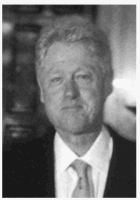 | |
| 32. "Wanted" Qualities we would like to see in our next "Drug Czar", Director of the Office of National Drug Control Policy, sadly lacking in former Director Barry McCaffrey. Available in printer-ready Portable Document Format (PDF). | 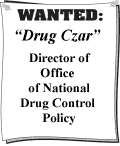 | |
| 31. "Voting Rights" No other democracy besides the U.S. disenfranchises convicted offenders for life. Many democratic nations, including Denmark, France, Israel, and Poland, permit prisoners to vote as well. Available in printer-ready Portable Document Format (PDF). |  | |
| 30. "Drug Courts: Can We Make Them More Effective?" Drug Courts are an evolving approach that substitutes mandatory treatment for incarceration. Because drug courts are new, much of the research on their effectiveness is recent, incomplete and inconclusive. Also available in printer-ready Portable Document Format (PDF). |  | |
| 29. "A Real War in Colombia?" No interdiction program has had any serious impact on the supply of illegal drugs in the U.S. Rather, these campaigns have spurred new source countries, new trafficking routes and new drugs. Available in Portable Document Format (PDF). |  | |
| 28. "What We Know About Ecstasy" The 'club drug', 'Ecstasy' (MDMA), has been attracting a lot of attention in the media. Some news reports are quite alarming. What do we we really know about Ecstasy and the 'rave' culture that has embraced it? Available in Portable Document Format (PDF). | 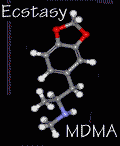 | |
| 27. "How We Judge a Fallen Hero" An insightful editorial on disgraced athlete Darryl Strawberry by Ethan Nadelmann, Director of the Lindesmith Center drug policy institute. Published in the San Francisco Chronicle and the Philadelphia Daily News, March 2000. Also available in Portable Document Format (PDF). |  | |
| 26. "What do America's major cities have in common with L.A.?" “Since 1995, 10 police officers from Philadelphia's 39th District have been charged with planting drugs on suspects, shaking down drug dealers for hundreds of thousands of dollars, and breaking into homes to steal drugs and cash.” - General Accounting Office, 1998 |  | |
| 25. "Findings of the British Police Foundation" A two-year study recently concluded that Britain should move away from the American model of tougher enforcement and longer prison sentences and move instead in the direction of other democracies in Western Europe, where possession of many drugs and hallucinogens has been decriminalized. Available in Portable Document Format (PDF). |  | |
| 24. "Just Say Not Guilty?" The injustices of the war on drugs have become obvious to many Americans. In cases where the law, the prosecutorial excesses, and the likely sentence seem manifestly unfair, jury nullification is a legitimate option. Available in Portable Document Format (PDF). |  | |
| 23. "The more we escalate the drug war, the more young people and others die." This advertisement observes how drug overdose deaths rise in concert with drug-related incarceration rates. It is also available in printer-ready Portable Document Format (PDF). |  | |
| 22. "Protecting kids?" This ad challenges the often heard justification for the drug war, drug prohibition protects children, with some sobering facts. Also available in Portable Document Format (PDF). |  | |
| 21. "What do we tell our kids?" This ad answers the issue that opponents of needle exchange use as their primary argument against needle exchange. Now that the science shows needle exchange reduces AIDS, does not increase drug use and helps get people into drug treatment, opponents of needle exchange argue exchanges send a bad message to our kids. Our view -- tell the kids the truth, it may save their lives. Also available in Portable Document Format (PDF). |  | |
| 20. "St. Valentine's Day For Whom?" Last St. Valentine's Day the United States surpassed two million people behind bars. This means the US will account for 1/4 of all the prisoners in the world. This record high level of incarceration is driven by the war on drugs. The purpose of this ad is to highlight these facts and ask the question: Are we becoming a police state? Also available in Portable Document Format (PDF). | 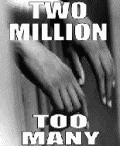 | |
| 19. "Time To Resign." General Barry McCaffrey consistently misstated the facts on key drug policy issues without apology when he is corrected. While we pointed out these factual errors we also applauded him when he has taken sensible positions, e.g. methadone (Pinocchio) and mandatory sentences (Let Judges Judge). Reports of his efforts to inject drug war messages into the media by paying for scripts and reviewing scripts in advance, as well as his efforts to involve the US in the Colombian civil war convinced us that it was time for General McCaffrey to resign -- he undermined too many basic American values in the name of the drug war. Also available in Portable Document Format (PDF). |  | |
| 18. "Let's Keep America's Drug Problem in Perspective" compares preventable causes of death and asks why we do not apply criminal solutions to the most common. Available in printer-ready Portable Document Format (PDF). | 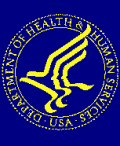 | |
| 17. "Ending the drug war is popular" is a column by CSDP President Kevin Zeese on changing attitudes toward our failed drug policy. "Americans recognize the drug war is not working: gangs and cartels are getting richer; adolescents have easy access to drugs, overdose deaths are at record highs. We are spending too much on a policy that doesn't work." Available in printer-ready Portable Document Format (PDF). |  | |
| General McCaffrey and other drug war advocates need to know that they will no longer be able to make false statements in support of the drug war. They will be called to task for it -- publicly. There are a lot of facts on drug policy. It is time for the debate on policy to be based on facts not falsehood. | ||
|
Common Sense for Drug Policy
1377-C Spencer Ave. Lancaster, PA 17603 717-299-0600 (phone) 717-393-4953 (fax) info@csdp.org |
| |
Copyright © 2001-2023,
Common Sense for Drug Policy
Accessed: [an error occurred while processing this directive] times